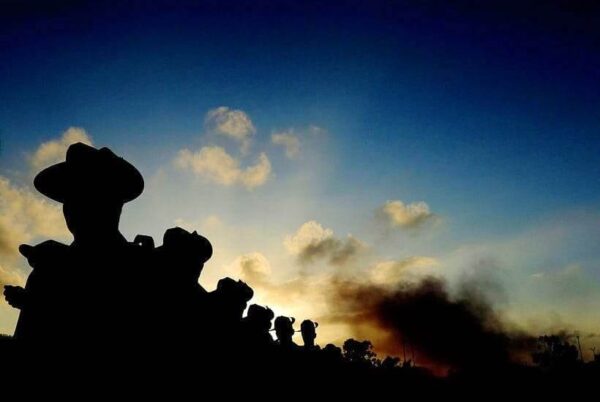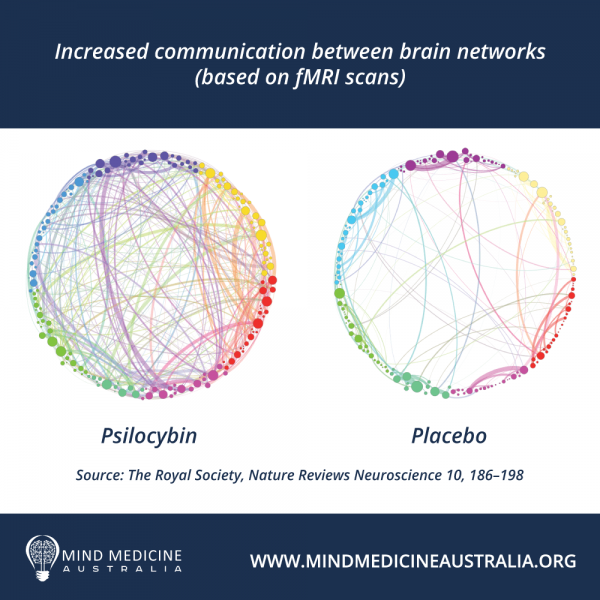In the lucky country we like to think of ourselves as free, prosperous and privileged. But is our luck running out and what might we do to get it back? Australia is now ranked as the OECD’s worst performer on tackling climate change, our vaccination rollout has by every measure been a dismal failure with Australia today ranked 113th in vaccinating its people, and we are now the nation with the second worst mental health statistics in the world, with only Iceland behind us. Something is clearly not right.
Somehow, we have created a society which promotes the consumption of all forms of alcohol, and where gambling is an addictive source of government revenue. Yet fungi that possess incredible medicinal powers and grows all by itself can, if consumed, put you behind bars.
We allow Australians to drink and smoke, eat ever-growing amounts of sugar, trans-fats and processed foods, causing an obesity epidemic of massive proportions that costs society billions of dollars a year. Doctors easily dole out anti-depressants and pain-killing opiates. Only an estimated 30-35% of depressed individuals in the general population experience remission from current pharmacotherapies or psychotherapies, with the majority experiencing ongoing symptoms, and significant side effects, and between 50% to 80% relapsing after treatment stop. To create positive change and healing, we need to be innovative and broaden the tools available to our medical practitioners and qualified therapists working in this area.
And how free are we if we don’t have access to all of the safe and effective medicines that could cure us when we are ill?
History, science and increasing amounts of data, now clearly demonstrate the enormous potential social benefits of psilocybin mushrooms (psilocybin is the psychoactive component in magic mushrooms) to our mental health, creativity and productivity. Yet digestion of psilocybin remains illegal in Australia, both for medical and recreational uses. Why do prevailing State laws make it illegal to eat completely safe, non-addictive, non-toxic and free wild mushrooms, which may just be growing right outside your door in this magic mushroom season? And yet it is perfectly legal to pick a poisonous mushroom growing nearby that may possibly kill you!
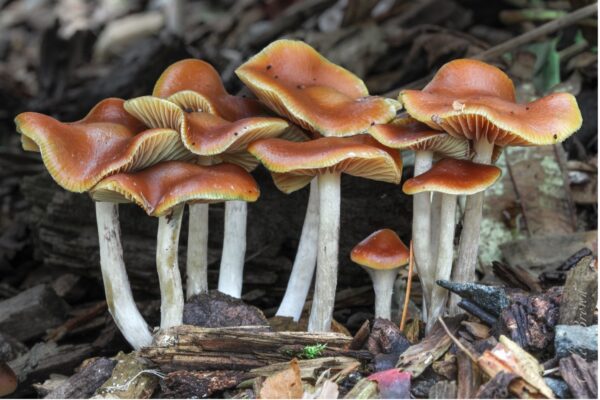
Far from making us ‘lose our minds’, it turns out that the educated, careful and responsible consumption of psilocybin mushrooms might just make us better and healthier people. And yet our minds, the cornerstone of everything we do in this short and finite life, are not as free as we may think.
There is nothing particularly radical or new about humans picking and consuming mushrooms, even those with psychoactive properties. Indeed, we would be hard pressed to find a single human culture anywhere, throughout thousands of years of recorded human history, that did not revere and use these medicinal sacraments to heal a variety of physical and mental ailments. Indeed, many now believe that the original story of our beloved Santa Claus is thought to have come from Nordic indigenous peoples who, along with their reindeer, were known to have regularly consumed the famous Amanita Muscaria mushrooms. Their white dots against a red-capped mushroom dome became the key colours of Christmas cheer.
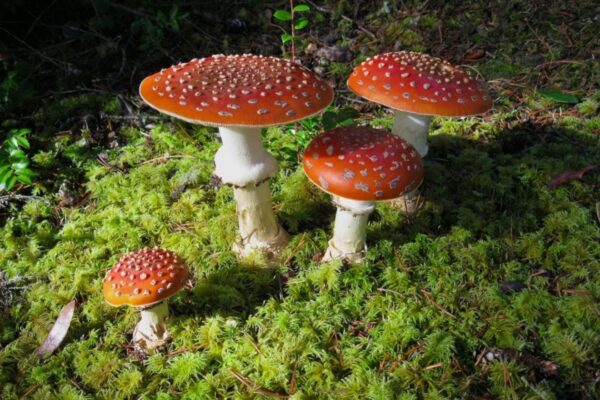
Though these mushrooms may have a reputation as daunting and dangerous, the science clearly shows that the individual and social dangers associated with the taking of psilocybin is far safer than almost all other drugs, even in recreational environments.
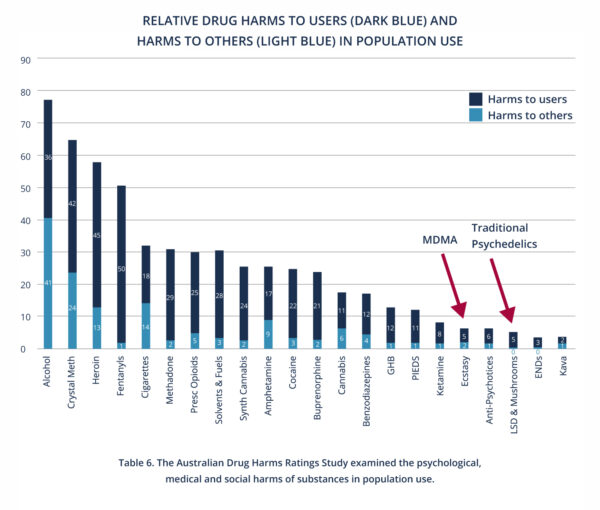
In scores of medical trials of these therapies at the world’s most prestigious Universities including Yale, Harvard, Oxford, Imperial and Johns Hopkins we are seeing remission rates of 60-80% amongst thousands of patients suffering with depression, anxiety, addictions and end-of-life distress. These results occur after just two to three medicinal doses in clinical settings, combined with a short course of psychotherapy. They have been shown to be effective, safe and non-addictive. Many patients describe the therapy as one of the top five most meaningful experiences in their lives! Whoever says that about any medicine?
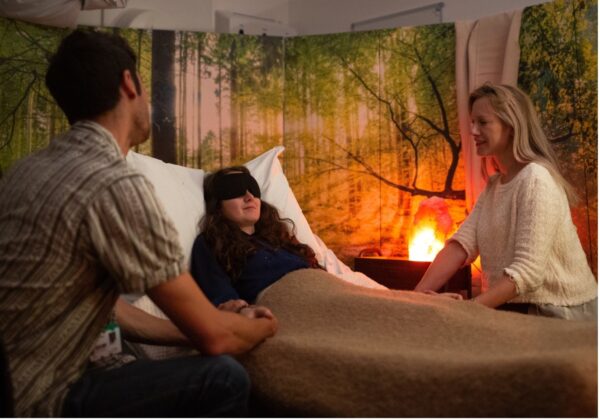
These outcomes are so promising that psilocybin-assisted therapies are now being studied for the treatment of anorexia and other eating disorders, a range of addictions, obsessive compulsive disorder, dementia, Parkinson’s disease and cluster headaches. The therapeutic use of mushrooms has been legalised in Canada and the U.S. State of Oregon, and compassionate access to these treatments for treatment-resistant patients is being granted in the USA, Switzerland, Israel, and even Australia.
Aside from the realm of mental health, mushrooms are known to fundamentally change things for the better. The pioneering work of globally well-known mushroom experts, including American Paul Stamets, demonstrates that mycelial networks from which mushrooms grow constitute a significant portion of the world’s precious topsoil. They are the neural pathways by which trees and other plants actually communicate with one another. These infinitely complex networks also have qualities that can detoxify waste and greatly enhance the strength and resilience of topsoil. Clearly, mushrooms can do extraordinary things!
Psilocybin mushrooms can intensely reconnect one’s mind and significantly alter consciousness in ways almost impossible to describe to those who have not had this experience. Psilocybin binds to a serotonin receptor called 5-HT2a and takes the brain into a state where it can flow more freely, unconstrained by prior and rigid beliefs about how the world is supposed to work. Psilocybin works through cracking open complexes of suffering contained within the body and brain. It is often said of conventional antidepressants that they merely ‘plaster over’ the root causes of suffering, whereas the defining property of psychedelic therapy is the ability to accelerate self-understanding through revelation leading to complete remission for many.
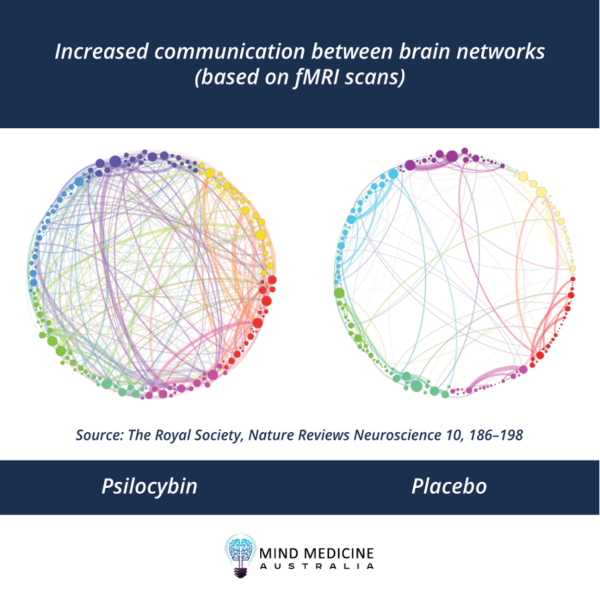
How can ingesting a mushroom that grows naturally all over Australia still be illegal? In a country that is ‘free’, how can picking a magic mushroom in your garden leave you subject to prosecution and imprisonment? Increasingly, with compassionate motivations, we allow people to use drugs to end their lives via euthanasia, yet we prevent the management of mental illness with a safe and effective medicine that could assist millions to overcome a whole range of health challenges.
As Covid-19 has shown, it is easier to treat an illness if you understand it. Mental illness is the world’s number one cause of disability, and depression is the largest contributor to this burden. Pre-Covid-19, anti-depressant medications were prescribed to one in eight of the adult population in Australia including one in four older adults and one in thirty children. And yet our rates of mental illness and suicides continue to grow. We clearly need a better approach based on science and proven treatments that get to the root cause of our suffering.
Our hope is that professionally delivered psychedelic therapy using psilocybin mushrooms can meet the massive need for breakthroughs in mental health care.
Action is needed now to ensure that these medicines are accessible and affordable to all and prevent further avoidable suffering and suicides. The recently completed Global Drug Survey showed that thousands of people sought self-treatment for psychiatric conditions and emotional distress with psychedelic-assisted therapies: 85% of them said their conditions improved as a result. People are taking matters into their own hands because they cannot wait any longer for a legal and medically controlled pathway.
Australia was a world-leading innovator in major issues such as the eight-hour work day, women’s vote, our superannuation and healthcare system and so much more. We often initiated positive change, but now our reefs, forests, unique animals, climate and coastlines are under severe threat and our international reputation is losing its shine. We need to find a way back.
Providing safe, medically controlled and legal access to effective medicines to everyone who needs them may be one of the answers. If we want to regain our world leading stature, we all need to reassess what it means to truly be free and make choices about the medicines that may heal us.
The Therapeutic Goods Administration (TGA) is currently conducting an Independent Review to reconsider the rescheduling of MDMA and psilocybin from Schedule 9 (Prohibited Medicine) to Schedule 8 (Controlled Medicine), while the Australian Government also recently announced a $15 million grant round for research into psychedelic-assisted therapies. However, huge obstacles remain, and there is still much to achieve to ensure we catch up and heal the immense suffering.
The next step is to ensure that all Australians enjoy the right to the highest attainable level of health, a right that is recognised under a plethora of human rights treaties Australia has freely ratified. To fully possess this right, everyone needs to have access to all the medicines in the medicine cabinet, and that includes magical mushroom medicine.
Tania de Jong AM
LL.B (Hons), GradDipMus
Tania de Jong AM is the co-Founder and Executive Director of Mind Medicine Australia. Tania has garnered an international reputation as an award-winning social entrepreneur, acclaimed soprano, inspirational speaker and storyteller, creative alchemist, philanthropist and spiritual journey woman. She is a passionate leader for social change. Her mission is to change the world, one voice at a time!
She regularly presents on creative, innovation, leadership, purpose, psychedelic-assisted therapies, mental health and wellbeing at major conferences and events around the world across the business, government, creative arts and community sectors. Tania is one of Australia’s most successful female entrepreneurs and innovators developing 6 businesses and 4 charities including Creative Universe, Creativity Australia and the With One Voice programs, Umbrella Foundation, Creative Innovation Global, Pot-Pourri and The Song Room.
Tania was named in the 100 Women of Influence, the 100 Australian Most Influential Entrepreneurs and named as one of the 100 most influential people in psychedelics globally. Her TED Talk has sparked global interest.
Scott Leckie
Scott A. Leckie is an international Human Rights lawyer, Law Professor and Director and Founder of Displacement Solutions, an NGO dedicated to resolving cases of forced displacement throughout the world, in particular displacement caused by climate change. He also founded and directs Oneness World Foundation (www.onenessworld.org), a think tank exploring questions of world-centric political evolution and new forms of global governance.
He hosts Jointly Venturing, a podcast dedicated to the question of world citizenship, and manages the One House, One Family initiative, an ongoing project in Bangladesh building homes for climate displaced families. He regularly advises a number of United Nations agencies and conceived of and was the driving force behind more than 100 international human rights legal and other normative standards, including UN resolutions – most recently the Peninsula Principles on Climate Displacement Within States. He has written 22 books and over 250 major articles and reports.

